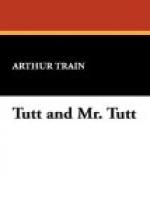“And if you don’t persuade society you go to the chair,” remarked Mr. Tutt laconically.
“To use another illustration,” exclaimed Tutt, warming to the subject, “the private ownership of property at the present time is recognized and protected by the law, but if we had a Bolshevik government it might be a crime to refuse to share one’s property with others.”
“In that case if you took your share of another’s property by force, instead of being a thief you would be a Progressive,” smiled his partner.
Tutt robbed his forehead.
“Looking at it that way, you know,” said he, “makes it seem as if criminals were rather to be admired.”
“Well, some of them are, and a great multitude of them certainly were,” answered Mr. Tutt. “All the early Christian martyrs were criminals in the sense that they were law-breakers.”
“And Martin Luther,” suggested Tutt.
“And Garibaldi,” added Mr. Tutt.
“And George Washington—maybe?” hazarded the junior partner.
Mr. Tutt shrugged his high shoulders.
“You press the analogy a long way, but—in a sense every successful revolutionist was in the beginning a criminal—as every rebel is and perforce must be,” he replied.
“So,” said Tutt, “if you’re a big enough criminal you cease to be a criminal at all. If you’re going to be a crook, don’t be a piker—it’s too risky. Grab everything in sight. Exterminate a whole nation, if possible. Don’t be a common garden highwayman or pirate; be a Napoleon or a Willy Hohenzollern.”
“You have the idea,” replied Mr. Tutt. “Crime is unsuccessful defiance of the existing order of things. Once rebellion rises to the dignity of revolution murder becomes execution and the murderers become belligerents. Therefore, as all real progress involves a change in or defiance of existing law, those who advocate progress are essentially criminally minded, and if they attempt to secure progress by openly refusing to obey the law they are actual criminals. Then if they prevail, and from being in the minority come into power, they are taken out of jail, banquets are given in their honor, and they are called patriots and heroes. Hence the close connection between crime and progress.”
Tutt scratched his chin doubtfully.
“That sounds pretty good,” he admitted, “but”—and he shook his head—“there’s something the matter with it. It doesn’t work except in the case of crimes involving personal rights and liberties. I see your point that all progressives are criminals in the sense that they are ‘agin the law’ as it is, but—I also see the hole in your argument, which is that the fact that all progressives are criminals doesn’t make all criminals progressive. Your proposition is only a half truth.”




